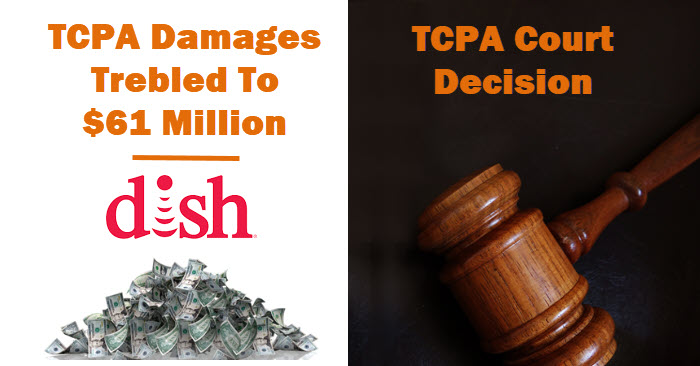The federal court has denied Dish Network’s motion to reduce or set aside the trebled damages awarded in Krakauer v. Dish Network. Earlier this year a North Carolina federal judge ordered Dish Network to pay treble damages of $61.5 million to class members in a Telephone Consumer Protection Act lawsuit. Under the TCPA, treble damages are available at the court’s discretion for violations that occur “willfully or knowingly.” The court came to that conclusion and ordered Dish to pay three times the $20.5 million jury verdict against Dish for violating the TCPA.
The Lawsuit
In his class action lawsuit, Thomas Krakauer alleged that he received dozens of telemarketing calls from Satellite Systems Network (SSN), a company calling on behalf of Dish. SSN called him despite the fact that his phone number was registered on the National Do Not Call Registry. He complained and was told that his number had been placed on the company’s internal Do Not Call list, yet their calls to his phone continued.
The court concluded that between 2004 and 2010, Dish ignored complaints from consumers who received calls from SSN. During that period, SSN initiated more than 50,000 calls to about 18,000 consumers whose phone numbers appeared on the National DNC Registry.
In its ruling, the court found that Dish’s contract with SSN allowed them unlimited rights to monitor and control SSN’s telemarketing activities. They also found that SSN “willfully and knowingly” violated the TCPA while acting as an agent of Dish. The court ruled that Dish failed in its responsibility to monitor and control their third-party vendor’s compliance with the TCPA and was therefore responsible for their actions which lead to repeated telemarketing violations.
“Res Judicata” – Dish Network’s Motion To Dismiss
Dish filed a motion to set aside the verdict based on res judicata. Res Judicata is a legal principle that means, once a matter has been judicially decided, it is final and the same issue or an issue arising from the first issue cannot be contested again. Dish pointed to a similar lawsuit brought by the FCC in Illinois Federal Court that resulted in a $280 million judgement against them.
“Dish did not take seriously the promises it made to forty-six state attorneys general.”
The Court rejected this argument. They found that Dish waived its right to assert the defense of res judicata because of its “prolonged silence, its representations to the Court and failure to object to the dual prosecution of this case and the Illinois Action.”
As for the damages awarded, the court found “minimal overlap” between the claims in the Illinois action and the Krakauer lawsuit. The award of treble damages was appropriate because of “the need to deter Dish from future violations and the need to give appropriate weight to the scope of the violations.” The courted repeatedly pointed to Dish’s failure to address TCPA violations by SSN telemarketers even though their contract allowed them to monitor and enforce compliance.
Conclusion
This case demonstrates where the court places liability when the actions of a third-party marketer are in question. TCPA compliance should be the number one priority of your business when working with third-party marketers. If not, you should be prepared to pay significant penalties.
We cannot stress enough how important it is for the hiring business to be actively involved in monitoring their third-party partner’s compliance with all telemarketing regulations. Prior to hiring a third-party, consider developing a comprehensive compliance monitoring/enforcement plan to reduce the risk to your business of regulatory violations committed by a third-party calling on your behalf. You don’t want to pay for their mistakes.
